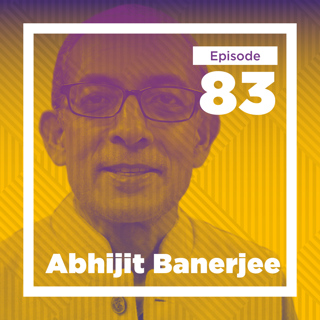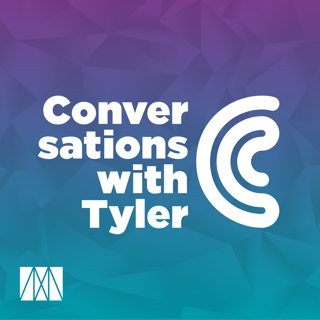
Ezra Klein on Why We’re Polarized
In his new book, Ezra Klein argues that polarization in America has become centered on partisan political identities, which has subsumed virtually every form of identity, be it where we live, what team we root for, the church we attend, or any other. This stacked form of polarization thus carries much more weight and is activated by a wider range of conflicts than before. But is polarization really such a pressing concern? If it’s all merged into one form of identity politics then aren’t we just polarizing more efficiently? Over what percentage of GDP are we more polarized today versus in the past? Tyler posed these questions to Ezra and more, including thoughts on Silicon Valley’s intellectual culture, his disagreement with Jonathan Haidt’s Moral Foundations Theory, the limits of telecommuting, how becoming a father made him less conservative, his post-kid production function, why Manhattan is overrated, the “cosmic embarrassment” of California’s governance, why he loved Marriage Story, the future of the BBC and PBS, what he learned in Pakistan, and more. Read a full transcript enhanced with helpful links. Recorded December 27th, 2019 Other ways to connect Follow us on Twitter and Instagram Follow Tyler on Twitter Follow Ezra on Twitter Email us: cowenconvos@mercatus.gmu.edu Subscribe at our newsletter page to have the latest Conversations with Tyler news sent straight to your inbox.
29 Jan 20201h 10min

Reid Hoffman on Systems, Levers, and Quixotic Quests
When Reid Hoffman creates a handle for some new network or system, his usual choice is “Quixotic.” At an early age, his love of tabletop games inspired him to think of life as a heroic journey, where people come together in order to accomplish lofty things. This framing also prompted him to consider the rules and systems that guide society—and how you might improve them by identifying key points of leverage. At first, he thought he’d become an academic and work with ideas as one of those Archimedean levers. But he ended up focusing on technology instead, helping to build PayPal, LinkedIn, and now many other ventures as an investor at Greylock Partners. But he still thinks ideas are important and tries to employ a “full toolset” when trying to shift systems. Reid joined Tyler to talk about all these leverage points and more, including the Silicon Valley cultural meme he most disagrees with, how Wittgenstein influenced the design of LinkedIn, mystical atheism, what it was like being on Firing Line, why he’s never said anything outrageous, how he and Peter Thiel interpret The Tempest differently, the most misunderstood thing about friendship, how to improve talent certification, what’s needed from science fiction, and his three new ideas for board games. Read a full transcript enhanced with helpful links. Recorded November 2nd, 2019 Other ways to connect Follow us on Twitter and Instagram Follow Tyler on Twitter Follow Reid on Twitter Email us: cowenconvos@mercatus.gmu.edu Subscribe at our newsletter page to have the latest Conversations with Tyler news sent straight to your inbox.
15 Jan 20201h

Slavoj Žižek on His Stubborn Attachment to Communism
This bonus episode features audio from the Holberg Debate in Bergen, Norway between Tyler and Slavoj Žižek held on December 7, 2019. They discuss the reasons Slavoj (still) considers himself a Communist, why he calls The Handmaid’s Tale “nostalgia for the present,” what he likes about Greta Thunberg, what Marx got right about the commodification of beliefs, his concerns about ecology and surveillance in communist states like China today, the reasons academia should maintain its ‘useless character,’ his beginnings as a Heideggerian, why he is distrustful of liberal optimism, the “Fukuyama dilemma” we face, the importance of “empty manners,” and more. Read a full transcript enhanced with helpful links, or watch the full video. Recorded December 7th, 2019 Other ways to connect Follow us on Twitter and Instagram Follow Tyler on Twitter Email us: cowenconvos@mercatus.gmu.edu Subscribe at our newsletter page to have the latest Conversations with Tyler news sent straight to your inbox.
8 Jan 20201h 26min

Abhijit Banerjee on Theory, Practice, and India
Want to support future conversations? Visit conversationswithtyler.com/donate. Long before Abhijit Banerjee won the 2019 economics Nobel with Michael Kremer and Esther Duflo, he was a fellow graduate student at Harvard with Tyler. For Tyler, Abhijit is one of the brightest economic minds he’s ever met, and “a brilliant theorist who decided the future was with empirical work.” But according to Abhijit, theory and practice go hand in hand: the real benefit of a randomized control trial isn’t getting unbiased estimates, he says, but in testing hypotheses borne out of theory. Abhijit joined Tyler to discuss his unique approach to economics, including thoughts on premature deindustrialization, the intrinsic weakness of any charter city, where the best classical Indian music is being made today, why he prefers making Indian sweets to French sweets, the influence of English intellectual life in India, the history behind Bengali leftism, the best Indian regional cuisine, why experimental economics is underrated, the reforms he’d make to traditional graduate economics training, how his mother’s passion inspires his research, how many consumer loyalty programs he’s joined, and more. Read a full transcript enhanced with helpful links. Recorded December 2nd, 2019 Other ways to connect Follow us on Twitter and Instagram Follow Tyler on Twitter Email us: cowenconvos@mercatus.gmu.edu Subscribe at our newsletter page to have the latest Conversations with Tyler news sent straight to your inbox.
30 Dec 20191h 2min

Tyler Looks Back on 2019 (BONUS)
Want to support future conversations? Visit conversationswithtyler.com/donate. For this special retrospective episode, producer Jeff Holmes sat down with Tyler to discuss the past year in conversations and more, including who was most challenging guest to prep for, the most popular—and the most underrated—conversation, a test of Tyler’s knowledge called “Name That Production Function,” listener questions from Twitter, how Tyler has boosted his productivity in the past year, and whether his book and movie picks from 2009 still hold up. Read a full transcript enhanced with helpful links. Recorded December 11th, 2019 Other ways to connect Follow us on Twitter and Instagram Follow Tyler on Twitter Email us: cowenconvos@mercatus.gmu.edu Subscribe at our newsletter page to have the latest Conversations with Tyler news sent straight to your inbox.
23 Dec 201952min

Esther Duflo on Management, Growth, and Research in Action
Want to support future conversations? Visit conversationswithtyler.com/donate. Esther Duflo’s advice to students? Spend time in the field. “It's only through this exposure that you can learn how wrong most of your intuitions are and preconceptions are,” she explains. For Duflo, it was time spent in the Soviet Union on the brink of collapse. While there she saw how Jeff Sachs used the tools of economics to advise policymakers on matters of crucial importance. To her it seemed like the best job in the world—and she began to pursue it in earnest. Now it is she who is advising governments on how best to reduce poverty, having co-founded one of the leading policy research centers in the world. That work, together with that of frequent collaborators Abhijit Banerjee and Michael Kremer, has now been honored with the Nobel Prize. She joined Tyler to discuss that work, including how coaching increases the effectiveness of cash transfers, why she cautions against falling in love with growth rates, what France gets right about child-rearing, the management philosophy behind her success building J-PAL, how she briefly became the face of an anti-Soviet revolution, the under-looked reasons behind the decline of geographic mobility in the United States, what rock climbing can teach us about being a good empirical economist, her daily musical move from Bach to Bob Dylan, and more. Read a full transcript enhanced with helpful links. Recorded November 12th, 2019 Other ways to connect Follow us on Twitter and Instagram Follow Tyler on Twitter Email us: cowenconvos@mercatus.gmu.edu Subscribe at our newsletter page to have the latest Conversations with Tyler news sent straight to your inbox.
18 Dec 20191h 1min

Daron Acemoglu on the Struggle Between State and Society
What determines the economic, social, and political trajectories of nations? Why were settlers in colonies like Jamestown and Australia able to escape the extractive systems desired by their British masters, while colonial subjects in Barbados and Jamaica were not? In his latest book, Daron Acemoglu elevates the power of institutions over theories centering on human capital, culture, or geography. Institutions help strike the balance of power in the constant struggle between state and society, creating a ‘narrow corridor’ through which liberty and prosperity is achieved. Daron joined Tyler for a conversation about drivers of economic growth, the economic causes and effects of democratization, how Germanic tribes introduced “bottom-up politics” to the Roman empire, the institutional reasons that China’s state capacity and control has increased with its wealth, his predictions for the future of liberty in his birth country of Turkey, the biggest challenges currently facing the Middle East, what we can learn from the example of Lagos, why publishing in the “top five” is overrated, tips on motivating graduate students, and more. Read a full transcript enhanced with helpful links. Recorded October 25th, 2019 Other ways to connect Follow us on Twitter and Instagram Follow Tyler on Twitter Follow Daron on Twitter Email us: cowenconvos@mercatus.gmu.edu Subscribe at our newsletter page to have the latest Conversations with Tyler news sent straight to your inbox.
4 Dec 201955min

Mark Zuckerberg Interviews Patrick Collison and Tyler Cowen on the Nature and Causes of Progress (Bonus)
Over the past year Mark Zuckerberg has held a series of interviews themed around technology and society. This conversation with Tyler and Patrick is the last in that series, and covers why they think the study of progress is so important, including how it could affect biomedical research, the founding of new universities and foundations, building things fast, housing and healthcare affordability, the next four years of the Chan Zuckerberg Initiative, and more. Read a full transcript enhanced with helpful links, or watch the full video. Recorded November 22nd, 2019 Other ways to connect Follow us on Twitter and Instagram Follow Tyler on Twitter Follow Patrick on Twitter Follow Mark on Facebook Email us: cowenconvos@mercatus.gmu.edu Subscribe at our newsletter page to have the latest Conversations with Tyler news sent straight to your inbox.
27 Nov 20191h 8min






















